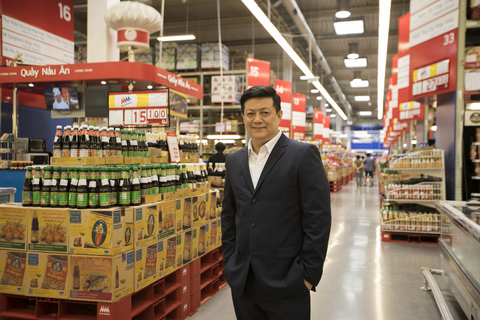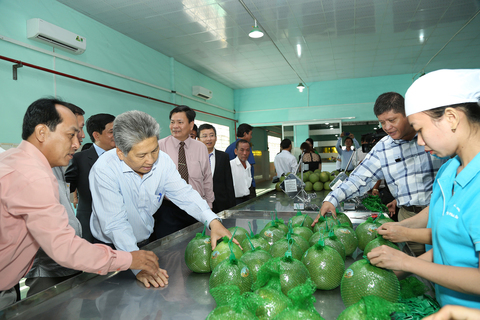
Phidsanu Pongwatana, Managing Director.
Having put its fourth food platform into operation in Viet Nam recently, Thai wholesaler MM Mega Market (MM) is fast-tracking production links to promote exports of Vietnamese agricultural products. Viet Nam News speaks with Phidsanu Pongwatana, Managing Director of its Viet Nam operations, on the company’s strategy to develop an agricultural model.
We learnt that MM Mega Market Vietnam has set up its first fruit platform in Viet Nam in Ben Tre. What is the underlying strategy?
As part of our strategy to push for strong growth of safe food supply chains for Viet Nam, the Ben Tre fruit platform began operation in late October as a source of supply of safe and quality fruit products for our 19 stores across the country. More importantly, this depot will also be an export base for Vietnamese fruits to go to China, Thailand and other Southeast Asian countries.
In phase I in 2018 the Ben Tre fruit platform is projected to run about 15 tonnes throughput a day. In phase II in 2019 the depot’s capacity will likely soar to about 50 tonnes a day.
In 2019 we will make good on our promise to expand vegetable and fruit exports to other Southeast Asian countries to the order of at least six containers of merchandise per month.
We plan to enlist around 100 farming households, mostly in and around Mekong River Delta provinces like Ben Tre, Tien Giang, Long An, Tra Vinh, Vinh Long, and Dong Thap to develop this platform.
To successfully set up a sustainable agriculture value chain in a changing world, production links and outlets play a vital role. However, there is a view that production links and sales are the weakest links in the agricultural production chain in Viet Nam. What is your view on that?
I really value the strong efforts by the Vietnamese Government to grow and develop agricultural value chains in recent years. However, despite the initial progress, connecting production and sales remains a weak link as outlet markets are still unsustainable. If we do better in connecting supply and demand, I believe that Vietnamese agricultural products will gain a significant reputation in regional markets.
In practice, the ‘good crop bad price’ dilemma seen over the years with many agricultural products is still ongoing at a huge cost to local agriculture and farmers in particular. If the link between production and sales can be further solidified, there is a good chance these challenges can be addressed.
We have been working on the development of sustainable value chains in agriculture since 2005 by growing a network of food platforms and entering into hands-on partnerships with local farmers to source high-quality supply for our 19-store system in the country and export to Thailand.
What do you think Viet Nam can do to further improve production linkages and sales so that the agribusiness model along value chains works better to successfully achieve the goal of enhancing the value of Vietnamese farm produce?
Policy wise, the Vietnamese Government has in place many incentives to help businesses and farmers get involved in the development of sustainable agricultural production chains. As a result, there has been a significant rise in the numbers of both domestic and foreign firms investing in local agriculture.
Statistics from the Ministry of Agriculture and Rural Development indicate that agro-forestry-fishery businesses have increased in number from 4,500 in 2016 to 5,661 last year. This provides the platform for Viet Nam to increase productivity and quality in agricultural production chains, thus building a brand name for Vietnamese agricultural products to reach out to the region and the world.
To improve the link between production and sales, we believe that the roles of the farmers and companies in value chains should be clearly defined. In this, businesses will take a leadership role, counselling farmers on seeds and breeds, techniques and technologies and production process monitoring, especially in output planning and connecting sales channels.
In this linked system, the farmer will become a vital element and should closely co-operate and comply with production processes guided by businesses to make sure the products are of high quality and meet national and international standards. This is a win-win relationship where risks and benefits are shared. Only with a strong and sustainable partnership between the farmer and business can the link between production and sales be effectively strengthened.

Visitors at the Ben Tre fruit platform set up in October this year. — VNS photo
MM Mega Market Vietnam has been one of the frontrunners in building and growing agricultural production chain since 2005. What is the goal of this strategy?
A supplier to near a million restaurants, hotels and canteens (HORECA) in Viet Nam, from the outset we gave top priority to food quality and safety. To ensure quality and safe supply, we need to maintain control throughout the process, from selection of seeds and breeds, to production and transportation to outlets.
Furthermore, since 2018 we have started exporting Vietnamese products to Thailand, meeting the needs of the 700-mall Thailand B network. We have also started exporting Vietnamese agricultural products to other markets, including China and some other regional markets.
To achieve the above two strategies, as early as in 2005 we developed and put into operation our Da Lat vegetable platform. Our Can Tho fish platform then got on board in 2011, and is now shipping nearly 2,000 tonnes of more than 400 fish products a year, followed by an advanced pork platform in Dong Nai in 2017, which is currently supplying southern MM stores nearly 400 tonnes of products a month, and more recently the Ben Tre fruit platform in operation since October this year.
Having run this value chain linkage model for over a decade, can you say something about MM's way of developing production linkages with farmers through the four food platforms?
At these four food platforms, we have been working very closely with farms. Our agricultural engineers work directly with local farmers and co-operatives every step of the way, from seed selection to production planning, harvesting, packaging, and hauling to platforms, without going through middlemen as a way to assure our best standards of quality and food safety.
Farming households joining the loop will need to maintain a farm logbook, recording in detail how they use pesticides and keeping a journal of harvest work, and conduct periodic quality testing in accordance with MM Mega Market Vietnam’s norms.
Every quarter we meet with farmers to discuss output plans and how much we will be buying. The farmers will be guided by how much we order in their production. This close partnership gives us more sourcing space and also provides the farmers the certainty they need for production. We are very proud that many farmers have been working with us for over a decade now, as much as we are proud to see the farmers who have been doing business with MM thrive and become rich.
Now with the four food platforms as a solid underpinning, can you disclose MM’s plans to export farm produce to Thailand, China and other markets in 2019?
Since the beginning of 2018, we have been exporting four containers, the equivalent of 100 tonnes, a month of staple products, including dragon fruit, sweet potato and snacks. After almost a year of exporting Vietnamese produce to Thailand’s 700-mall Big C system, these products are now much welcomed by Thai consumers.
Given the increasing demand, in 2019 MM Mega Market Vietnam plans to double output to approximately 200 tons a month. In addition to the traditional exports from this year, we will continue launching more new and high-value product lines, including frozen catfish, cuttlefish, milk fruit, and, especially, pomelo, to Thailand and other markets. — VNS